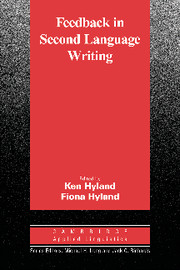Book contents
- Frontmatter
- Contents
- Contributors
- Series editors' preface
- Preface
- Chapter 1 Contexts and issues in feedback on L2 writing: An introduction
- I SITUATING FEEDBACK: SOCIOCULTURAL DIMENSIONS
- II SHAPING FEEDBACK: DELIVERY AND FOCUS DIMENSIONS
- Chapter 5 Does error feedback help student writers? New evidence on the short- and long-term effects of written error correction
- Chapter 6 Electronic feedback and second language writing
- Chapter 7 Resource-rich Web-based feedback: Helping learners become independent writers
- Chapter 8 Feedback in portfolio-based writing courses
- Chapter 9 Students and research: Reflective feedback for I-Search papers
- III NEGOTIATING FEEDBACK: INTERPERSONAL AND INTERACTIONAL DIMENSIONS
- Author index
- Subject index
Chapter 5 - Does error feedback help student writers? New evidence on the short- and long-term effects of written error correction
Published online by Cambridge University Press: 05 October 2012
- Frontmatter
- Contents
- Contributors
- Series editors' preface
- Preface
- Chapter 1 Contexts and issues in feedback on L2 writing: An introduction
- I SITUATING FEEDBACK: SOCIOCULTURAL DIMENSIONS
- II SHAPING FEEDBACK: DELIVERY AND FOCUS DIMENSIONS
- Chapter 5 Does error feedback help student writers? New evidence on the short- and long-term effects of written error correction
- Chapter 6 Electronic feedback and second language writing
- Chapter 7 Resource-rich Web-based feedback: Helping learners become independent writers
- Chapter 8 Feedback in portfolio-based writing courses
- Chapter 9 Students and research: Reflective feedback for I-Search papers
- III NEGOTIATING FEEDBACK: INTERPERSONAL AND INTERACTIONAL DIMENSIONS
- Author index
- Subject index
Summary
Attitudes and approaches toward student error have been a source of debate among second language acquisition (SLA) and second language (L2) writing scholars for more than two decades. The debate has ranged from calls for correction of all student errors to prevent fossilization (e.g., Higgs & Clifford, 1982; Lalande, 1982) to a preference for selective correction that focuses on patterns of error that can be addressed productively (Bates et al., 1993; Ferris, 1995c; Hendrickson, 1978) torecommendations that all error correction be eliminated because it is unnecessary, ineffective and even counterproductive (Cook, 1991; Corder, 1981; Krashen, 1984; Selinker, 1992; Truscott, 1996).
The issue of error treatment (including error analysis, feedback, and instruction) is especially salient in the case of L2 writing classes for two reasons. First, despite disagreement on other points surrounding error correction, there is a fair amount of agreement among researchers on two counts: (1) that accuracy in writing matters to academic and professional audiences and that obvious L2 error may stigmatize writers in some contexts (Ferris&Hedgcock, 1998; Horowitz, 1986; James, 1998; Johns, 1995); and (2) that L2 student writers themselves claim to need and value error feedback from their instructors (Cohen & Cavalcanti, 1990; Ferris, 1995b; Ferris & Roberts, 2001; Hedgcock & Lefkowitz, 1994; Leki, 1991; Truscott, 1996). Second, the research base on the question of whether error feedback helps students to improve in the short run or over time is inadequate as to number of studies and inconsistent as to research design (Ferris, 1999, 2004; Polio, 1997).
- Type
- Chapter
- Information
- Feedback in Second Language WritingContexts and Issues, pp. 81 - 104Publisher: Cambridge University PressPrint publication year: 2006
- 195
- Cited by



